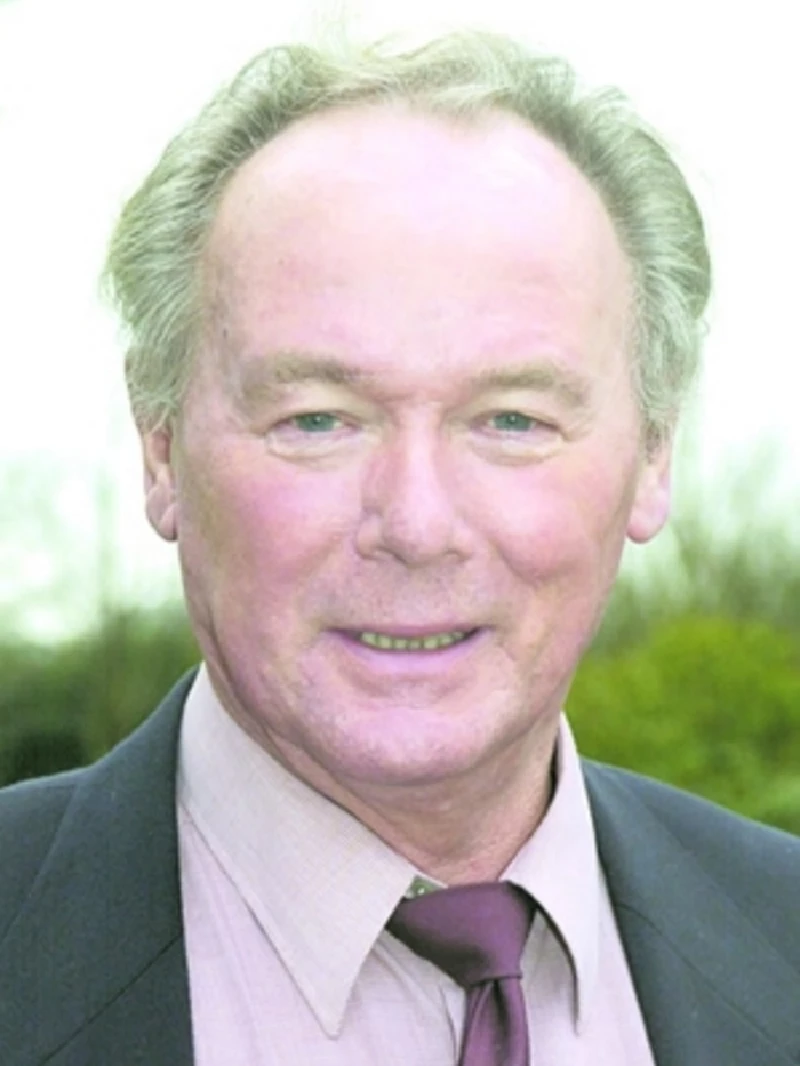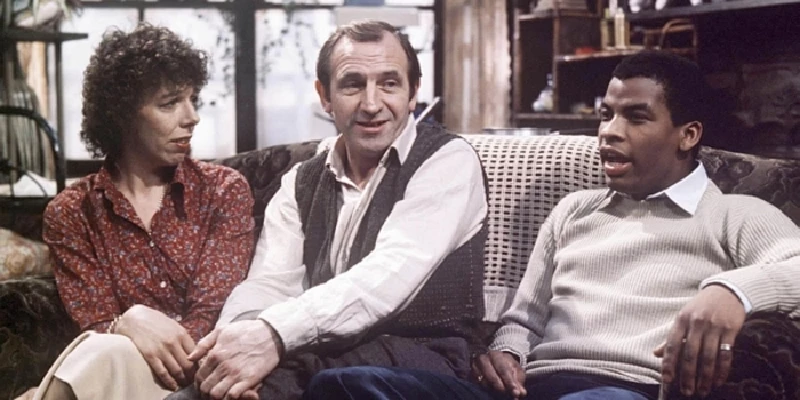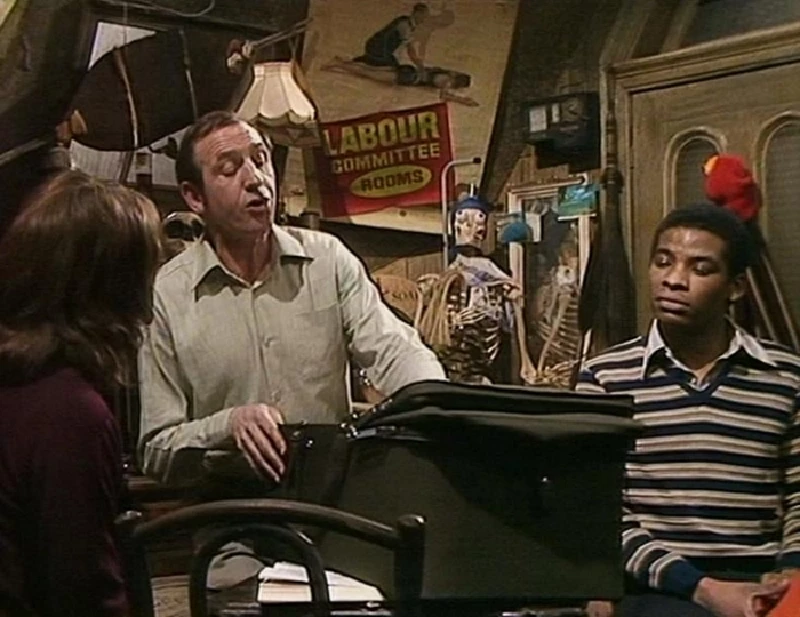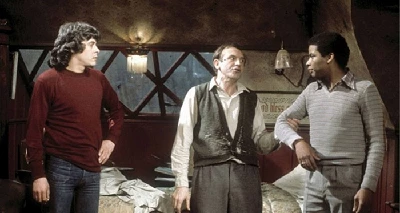Eric Chappell - Interview 1
by Adam Coxon
published: 27 / 5 / 2020

intro
In the first part of a two part interview, Adam Coxon talks to comedy writer Eric Chappell about his classic 70's TV series 'Rising Damp', and also 'The Banana Box', his earlier play which provided the inspiration for it.
Eric Chappell is a national treasure. After writing 25 plays and TV classics such as ‘Rising Damp’, ‘Only When I Laugh’ and ‘Duty Free’, to name but a few, is it any wonder that he is one of the UK’s most iconic comedy writers and playwrights? Eric’s work has been loved by millions of viewers over the last fifty years, and continues to be discovered and enjoyed by new audiences. His plays continue to be performed by theatre companies all over the world. A master of observation and characterisation, ‘Rising Damp’ is a perfect example of Eric’s skill in this area. Rigsby (Leonard Rossiter), the miserly, suspicious yet vulnerable landlord, is constantly vying for the attentions of the somewhat prim and proper yet lustful Miss Jones (Frances de la Tour). Philip (Don Warrington), the suave ‘son of a chief’ with ten wives, along with innocent and loveable medical student, Alan (Richard Beckinsale), are the perfect foil to Rigsby’s insecurities, which are deeply rooted in his fear of change. Set before the backdrop of a safe and comfortable, yet dingy boarding house, as their stories unfold, hilarity ensues. Eric’s book containing the complete scripts of ‘Rising Damp’ was a success, and he will shortly be publishing another volume featuring the scripts from his other hit TV show, ‘The Squirrels’. Adam Coxon went to meet Eric at his home to hear about the life and career of a perfect gentleman and to find out if there really is oil in the Pennines. AC: So, you were an Electricity Board auditor in Leamington Spa? EC: No, it was more remote than Leamington Spa. It was Hinckley. It’s lesser known than Leamington Spa. AC: Why Hinckley? Where’d that come from? EC: Well, I got a job there. I worked at Grantham at the Electricity Board as a junior clerk and then I put in for a job as an auditor. I’d got a few exams and I got a job there and then I went to Hinckley to do that area. It was convenient. From there I did audits at Leicester, Nottingham, Leamington Spa, Northampton and all those areas. I was there for a life sentence. Actually it was fifteen years that I was at Hinckley. I had two children and everything got progressively harder to get away from the steady job. How do you become a writer when you’ve got a family to support? I didn’t do it easily. and so I wrote quietly in the evenings. I wrote terrible novels. I mean awful novels that I thought ought to be quite good but weren’t. I remember reading them years later and hating them. And I discovered you always have a thought that changes your life and mine was in the bath. Most of my thoughts were in the bath, and I thought “I can’t write these novels. They’re rubbish – I think I’ll write a play,” and that was as simple as that. “I’ll write a play”. I’d never done one before. So, I wrote ‘The Banana Box’. And all of a sudden I realised there was something I could do, not all the time well but some of the time quite well. That’s how it became, and it changed my life. So, I sent my kids and family away. I got the typewriter out and I typed it for a week. I’d done a rough draft and my rough drafts are awful. I always tell people when they say, “My stuff’s not very good”, always hate your first draft because you can change it totally, and so I’d written this terrible first draft. I typed it for a week and it gradually improved as I was doing it. When I finished it on the Saturday, I remember walking in the sunshine down to the post office to post it. I’d got an agent who liked some of the early stuff I’d done but hadn’t finished, and I posted it saying, “It’s a well-worn path. It’s about a bit of a racial prejudice and that sort of thing. It probably won’t take but I thought I’d do it”. When I posted it, I thought to myself, “I’m a playwright. Whatever else I am now, I’m a playwright”. And I was. That’s the first time I ever acknowledged the fact that I had a title. So, I went on holiday. I think we went to Cromer. I came back from Cromer, and there were two letters from my agent. The first one said, “Michael Codron thinks it’s great and wants to do it”. Mike Codron was a big name in those days. I didn’t even know him or even his name. Then I opened the second one which my agent had posted first, and it said “Eric, I like your script but I’m not sure we can place it.” But he had done! He knew people, and it makes you realise that it’s important that your agent knows people and you get known, and that changed my life really. Leon Gluckman, was a West End producer who’d done ‘Wait a Minute’ and was quite well known. He liked it. He was from South Africa and he liked the African flavour, and my agent Bryan Drew showed it to him and he thought, “Gosh, yes, this has got something,” and he said, “I’ll take it to the West End,” and it was as simple as that. That was when I gave up working for the Electricity Board. I thought if I was going to go in the West End I must have some following. I’d done one or two bits and pieces that the BBC had taken, radio things, and I thought, “Yes, I might make a living”. My wife Muriel and I decided to quit our jobs at Hinckley and go back to Grantham where we’d got babysitters. My mum and dad lived there. So, I went back there and started writing. And the first thing that happened to me after I got back to Grantham, after suddenly leaving the Electricity Board after 23 years there, was that the phone rang three times that morning, all for the Electricity Board. You won’t believe that was a coincidence! What happened was that my number was 2311 and the Electricity Board was 2331, and people were in a bit of a state when they’d been cut off and dialled the wrong number and rang me. I said, “Hello…” “Is that the Electricity Board? Because I’m going to complain about this.” I said, “No, I’m not the Electricity Board,” but was called three times that morning and was asked Electricity Board details. I never got short of money. I was going to go and starve in a garret and we never did anything but make money. It was one of the most ridiculous things, one of those gambles that comes off. Everybody when I left the board thought I was mad. “A writer? He’s not a writer. And he’s going to earn a living?” They didn’t know how poorly paid I was but in the end of the day it happened and we couldn’t stop making money. I sold two shows to television. I remember my agent said, “You’re submitting ‘Rising Damp’? Good – but submit ‘The Squirrels’ as well.” I said “Well, if they take both...” He interrupted and said, “They won’t take both. We’re not going to get them to take one.” They took both. AC: You were saying that you got the idea when you were in the bath that you wanted to write a play. EC: Yes, as against novels. AC: You got the inspiration for ‘The Banana Box’, however, after reading a story about a black student in a newspaper. EC: That’s true. After I decided to write plays, I fished around for ideas, and, after two attempts at plays without really finishing them, I got enough interest from my agent who said, “You can do this,” but we never sold anything. I was reading a newspaper, and I read about a black student going to a hotel and pretending to be a prince and getting very well treated by a bigoted landlord. It didn’t say bigoted but that’s the feeling you got. He got well treated. I thought, “What a great idea for a farce!” but I wrote a verbal comedy instead. I was still discovering my style, and I changed the whole concept. The idea was still the same but the landlord became somebody I knew. I based him on a landlord who was a lovely guy but he was prejudiced as hell. How can you be prejudiced and still be a lovely guy? But he was. And I thought, “He’s a great character,” and so I used him. With Philip the black guy’s character, I didn’t know any black people, so it had to be something out of books and I got a book on African folklore which I found riveting. I enjoyed it, and I thought, “I can put this stuff in from the book. I can make this boy as innocent about his blackness as me,” and so made him fabricate himself in the same way as I did because I didn’t know any black students. In fact, when Mike Codron picked it up he thought I was a student. It’s the last thing in the world I was. He thought I was a graduate or something like that and I was nothing of the sort, so I must have been a huge disappointment. With regards to Miss Jones, I’d never written for a woman before, so I thought, “How the hell do I write for a woman?” A man writing for a woman always has misgivings he’s not getting it right. So, I created this sort of quaint figure, and once I’d taken that on and given her some lines that sounded even quainter still, I realised I’d got a character. She wasn’t feminine and was like my one of my aunties, who were often puritanical sort of ladies. I remember my Auntie Emily saying, “My husband has never seen me naked,” and I thought, “What a funny thing!” And so that became the basis of the puritanical thing. It worked for her. At the same time she wanted something from him. She wanted romance on her terms. So. the play slightly evolved. I brought in a black girl, but I felt I was doing too much of that. “Well it’s got to be a black girl, a white boy”. That wasn’t the way to do it. When I did the series, I used the black girl but I realised that was loading it too much. It was too difficult to write. AC: Was this the girl that played Philip’s girlfriend? EC: Yes, that’s right. She was a lovely girl but I realised that, for me, as a writer, it was too difficult to keep all these balls in the air. So, I didn’t do that, I just concentrated on four characters, and it worked because of that. I always remember when we did the first show on television that when Len came on, after he’d been introduced to the black student, his look of resignation and disappointment brought the house down. I thought, “I don’t have to write these lines. I’m getting a lot of laughs I haven’t earned and don’t deserve,” and that made the show easier to write because Len could get a laugh anyway out of just walking on. So, that was a big plus. AC: The premiere, so to speak, of ‘The Banana Box’ was in 1971. ‘Steptoe and Son’ would have been at the peak of its pulling power at the time. I’d imagine. EC: Galton and Simpson were my idols. They were the first people in our country to write stories through dialogue, and they had such a way of doing it, and I thought, “These guys can write”. Until then, it was mainly stand-up comedy and jokes. These guys were telling a story within the words and I thought, “I wish I could do that”. So, they were always my mentors. And from that day on I concentrated on telling a story through words and through dialogue, and I think that’s always been my intention. It’s what people say to each other and what people don’t say, what we say in the trade is ‘the subtext’, which tells you what they’re thinking, but sometimes not obviously so. AC: How was Wilfrid Brambell who played Steptoe cast in ‘The Banana Box’ as the first Rooksby? EC: The part was not altered very much for Wilfrid Brambell. He played it well enough. We got Keith Drinkel as well, who was very good. We got Neville Aurelius and Janet Michael. I couldn’t fault the performances, and I thought we’d put a good show out and it went well. Some nights it went really well and it was good enough but Michael Codron didn’t like the alterations we’d done and we did make a few to make it what we thought was more thespian. And anyway, he didn’t think it could be backed. He didn’t take it. It was too risky. Then a year went by and Leon Gluckman read the script and liked it and took the risk, but he actually didn’t make any money either because we didn’t have the names. They wanted to take it years later to the West End when we were big and had got to number 1. AC: Surely Wilfrid Brambell was a great draw though, wasn’t he? EC: He was a draw but he was out of character for what people thought of him. AC: Because they were so used to seeing him as Steptoe? EC: Yes, exactly. They saw him as this character in ‘Steptoe and Son’ and they couldn’t shake that free, so, although he was good, he didn’t let us down - nobody let us down - it just didn’t quite come off. I thought the show would still work one day. I know a lot of people who saw it said, “My God, this is good”. The critics liked it but didn’t like it enough. And a lot of people didn’t go to see it. But many of those that did liked it. AC: The part before Wilfred Brambell got it was originally offered to Leonard Rossiter, wasn’t it? EC: No, it was Peter Woodthorpe. AC: I’ve read that Leonard had been offered it but that he couldn’t do it. EC: It may have been so. I don’t know. All I know is Len took it when he took it and Leon offered it to him. And he was a name within the business, an already arising name but he wasn’t box office. When I first socialised with Leonard we’d go into a pub, we’d have a drink, a pint at the bar, nobody said a word. Then once we started going out during the production of the show it was, “Oh, come in, Mr Rossiter. Would you like the table by the window?” I thought. “This is the power of television”. And it happens to everybody who goes on the box. They become famous. AC: When ‘The Banana Box’ transferred to the West End, I’ve read that you were uncertain about whether it had a place in the West End. EC: I was never confident. I’ve never been confident in my life. I’ve written better plays but people wouldn’t agree with me. I had this feeling that we would succeed. I knew the play would work, I didn’t get any great feeling of “Oh, the play’s worked. People love it”, I just thought there’s lots of room for success in the West End but not for me. I didn’t have any confidence. AC: Was that anything to do with the cast in the West End? EC: No, I thought they did a good enough job. Don Warrington was the newcomer. He was worried about his nerves, worried about whether he’d stand up to the pressure, which he did. That was the only fear. Elizabeth Adare and Frances de la Tour were both confident and were good. We had Paul Jones as Alan. Paul was very confident as well and played the part perfectly well. I don’t think there were any weaknesses there. AC: We have come to learn that the name of Rooksby was changed to Rigsby. EC: Oh, yes, that was a simple story. They rang me up and said, “E ric, we’ve got to change the name.” I said, “Why?” and they said, “Well, because Len’s given an interview about the show.” There was a man called Rooksby who was a landlord, and he said, “My God. They’re going to ruin me,” and he rang the agent and wrote to us and said, “Look, my name’s Rooksby. You’re doing a sitcom about a landlord who’s horrible and I don’t want you to,” and they took note and they said, “Eric, would you change the name?” I went through the telephone directory and I thought, “It’s got to be a name that’s got slightly sleazy indications,” and I thought, “Rigsby.” AC: What was the reason that the character of Noel was changed to Alan? EC: No reason at all! I can’t think of any reason except that I was re-writing the show I was taking things out, I took out the black girl, even though Elizabeth Adare eventually appeared in the Christmas special. I don’t know why I did all the things I did then. It’s a long time ago. All I know was that Alan seemed a neater name than Noel. I don’t know why I did it. AC: How easy was it to adapt ‘The Banana Box’, the stage play, so that it become ‘Rising Damp’, the TV sitcom? EC: No trouble at all. First of all I was going to write it without the black prejudice. and then I remember the producer Duncan Wood saying to me, “We need that character!” I was worried about the racial mix for a sitcom, but Duncan thought it was a vital ingredient and he was right.
Band Links:-
https://en.wikipedia.org/wiki/Eric_ChappellPlay in YouTube:-
Picture Gallery:-


interviews |
|
Interview 2 (2020) |

|
| In the second part of a two part interview, Adam Coxon continues to talk to comedy writer Eric Chappell about his seminal '70s sitcom 'Rising Damp' and its huge success. |
most viewed articles
current edition
John McKay - InterviewRobert Forster - Interview
Cathode Ray - Interview
When Rivers Meet - Waterfront, Norwich, 29/5/2025
Spear Of Destiny - Interview
Fiona Hutchings - Interview
Chris Wade - Interview
Carl Ewens - David Bowie 1964 to 1982 On Track: Every Album, Every Song
Claudia Brucken - Interview
Shrag - Huw Stephens Session 08.12.10 and Marc Riley Session 21.03.12
previous editions
Heavenly - P.U.N.K. Girl EPManic Street Preachers - (Gig of a Lifetime) Millennium Stadium, Cardiff, December 1999
Boomtown Rats - Ten Songs That Made Me Love....
Beautiful South - Ten Songs That Made Me Love...
Barrie Barlow - Interview
Oasis - Oasis, Earl's Court, London, 1995
Trudie Myerscough-Harris - Interview
Dwina Gibb - Interview
Pixies - Ten Songs That Made Me Love...
Doris Brendel - Interview
most viewed reviews
current edition
Peter Doolan - I Am a Tree Rooted to the Spot and a Snake Moves Around Me,in a CircleVultures - Liz Kershaw Session 16.06.88
Vinny Peculiar - Things Too Long Left Unsaid
Garbage - Let All That We Imagine Be The Light
John McKay - Sixes and #Sevens
Pulp - More
Lapsley - I'm a Hurricane, I'm a Woman In Love
HAIM - I Quit
Billy Nomates - Metalhorse
Little Simz - Lotus
Pennyblackmusic Regular Contributors
Adrian Janes
Amanda J. Window
Andrew Twambley
Anthony Dhanendran
Benjamin Howarth
Cila Warncke
Daniel Cressey
Darren Aston
Dastardly
Dave Goodwin
Denzil Watson
Dominic B. Simpson
Eoghan Lyng
Fiona Hutchings
Harry Sherriff
Helen Tipping
Jamie Rowland
John Clarkson
Julie Cruickshank
Kimberly Bright
Lisa Torem
Maarten Schiethart